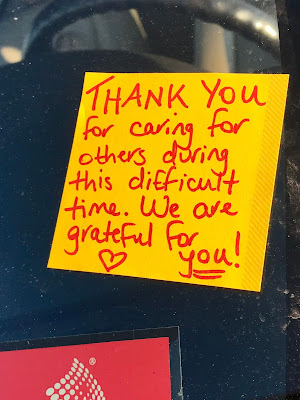COVID Diary 7
If the protesters could see the panic I saw
in six words
It feels like I can't breathe
She's not normally a complainer, she said
But it feels like I can't breathe
Can you hang these in the window, he said
I rolled the tape into circles
Doesn't have to be fancy, he said
Here she is, he said
He held it so I could see:
Get better, Grandpa!
I washed his proud back and pretended not to notice the weeping
Together we watched the small rabbit outside his window.
A permitted visitor.
I can't find the words
This is my last week as a hero
View COVID Diary 6 here
Original story here
https://www.amy-phillips.com/


I spent most of my twelve-hour shift yesterday in covid rooms, as four of my nine assigned patients were positive. The time it takes to gear up and down for these rooms is significant, and once you're in there, you try to get everything done--vitals, blood sugars, EKGs, toileting, baths, bed changes, new electrode stickers, etc.
ReplyDeleteEach time I go to work, the number of covid isolation rooms increases. I understand this to mean that the peak has flattened, which in turn translates to a longer period of time when a surge of patients is expected.
While my unit doesn't look like what you see on the news in places like NYC, it is full and we are steadily busy. Staff members are caught up in isolation rooms for long periods of time and are, for the most part, alone with a patient. As a nurse tech, I might hope to make a quick trip inside a room, but these patients are very sick and I have to be on my toes. Oxygen levels can dip dangerously low with covid, and while the sicker patients are next door in the ICU (my unit hasn't fully transitioned yet), we have to be smart. I applaud the nurses on my floor. With the pandemic, they are asked to anticipate and investigate in new ways, and they have met the challenge. My only wish is that I can be present for a covid discharge on my last shift Saturday, to enjoy "Here Comes the Sun" playing through the overhead speakers.
When people ask why the public is asked to wear masks now but not earlier, I think about my experience in these rooms. We've always worn gowns, masks, face shields/PAPRs and gloves, though of course we've been rationing the masks to one per day even though they're designed to be thrown away after a single use. A few weeks back we were asked to also put masks on covid patients when we enter their rooms to protect us further. Covid patients cough. They let loose with unpredictable and relentless barking. So the hospital figured we should contain some of those respiratory droplets, which is a good idea.
But here's the reality we face: some patients have dementia. Some are autistic. At times we have to help them eat, so the mask can't be worn. I feel as if I'm adding to the suffering of a coughing patient when I put a mask on them; at the same time, I feel very unsafe if I don't.
Yesterday I saw panic in a woman's eyes. I was alone with her, a woman in her 40s. I was careful to both console her fears and reassure her that we would do everything we can to make her better. At the same time, I carefully measured my next actions in case she was on the brink of a turn for the worse. (Later, while I was caught up in another covid room, she desatted and staff had to rush into her room.)
This is what I wish the protesters could understand: not only are patients suffering, but despite all the best, well-intentioned guidelines and training, workers on the frontlines are very literally facing death. It could happen to any of us.